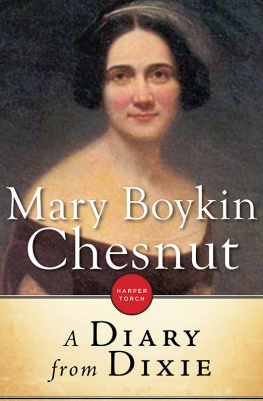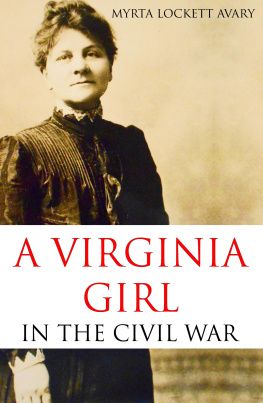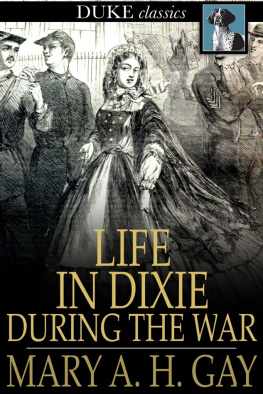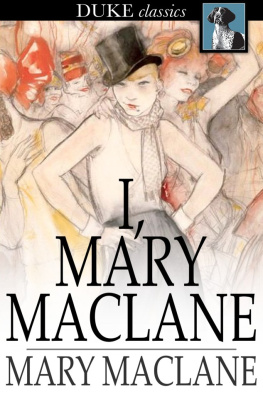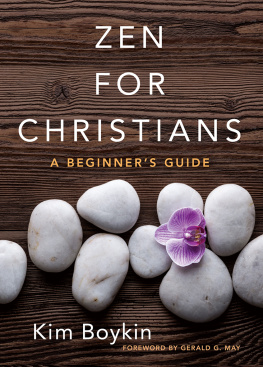INTRODUCTION
The Author and Her Book
In Mrs. Chesnut's Diary are vivid pictures of the social life that went on uninterruptedly in the midst of war; of the economic conditions that resulted from blockaded ports; of the manner in which the spirits of the people rose and fell with each victory or defeat, and of the momentous events that took place in Charleston, Montgomery, and Richmond. But the Diary has an importance quite apart from the interest that lies in these pictures.
Mrs. Chesnut was close to forty years of age when the war began, and thus had lived through the most stirring scenes in the controversies that led to it. In this Diary, as perhaps nowhere else in the literature of the war, will be found the Southern spirit of that time expressed in words which are not alone charming as literature, but genuinely human in their spontaneousness, their delightfully unconscious frankness. Her words are the farthest possible removed from anything deliberate, academic, or purely intellectual They ring so true that they start echoes. The most uncompromising Northern heart can scarcely fail to be moved by their abounding sincerity, surcharged though it be with that old Southern fire which overwhelmed the army of McDowell at Bull Run.
In making more clear the unyielding tenacity of the South and the stern conditions in which the war was prosecuted, the Diary has further importance. At the beginning there was no Southern leader, in so far as we can gather from Mrs. Chesnut's reports of her talks with them, who had any hope that the South would win in the end, provided the North should be able to enlist her full resources. The result, however, was that the South struck something like terror to many hearts, and raised serious expectations that two great European powers would recognize her independence. The South fought as long as she had any soldiers left who were capable of fighting, and at last "robbed the cradle and the grave." Nothing then remained except to "wait for another generation to grow up." The North, so far as her stock of men of fighting age was concerned, had done scarcely more than make a beginning, while the South was virtually exhausted when the war was half over.
Unlike the South, the North was never reduced to extremities which led the wives of Cabinet officers and commanding generals to gather in Washington hotels and private drawing-rooms, in order to knit heavy socks for soldiers whose feet otherwise would go bare: scenes like these were common in Richmond, and Mrs. Chesnut often made one of the company. Nor were gently nurtured women of the North forced to wear coarse and ill-fitting shoes, such as negro cobblers made, the alternative being to dispense with shoes altogether. Gold might rise in the North to 2.80, but there came a time in the South, when a thousand dollars in paper money were needed to buy a kitchen utensil, which before the war could have been bought for less than one dollar in gold. Long before the conflict ended it was a common remark in the South that, "in going to market, you take your money in your basket, and bring your purchases home in your pocket."
In the North the counterpart to these facts were such items as butter at 50 cents a pound and flour at 12 a barrel. People in the North actually thrived on high prices. Villages and small towns, as well as large cities, had their "bloated bondholders" in plenty, while farmers everywhere were able to clear their lands of mortgages and put money in the bank besides. Planters in the South, meanwhile, were borrowing money to support the negroes in idleness at home, while they themselves were fighting at the front. Old Colonel Chesnut, the author's father-in-law, in April, 1862, estimated that he had already lost half a million in bank stock and railroad bonds. When the war closed, he had borrowed such large sums himself and had such large sums due to him from others, that he saw no likelihood of the obligations on either side ever being discharged.
Mrs. Chesnut wrote her Diary from day to day, as the mood or an occasion prompted her to do so. The fortunes of war changed the place of her abode almost as frequently as the seasons changed, but wherever she might be the Diary was continued. She began to write in Charleston when the Convention was passing the Ordinance of Secession. Thence she went to Montgomery, Ala., where the Confederacy was organized and Jefferson Davis was inaugurated as its President. She went to receptions where, sitting aside on sofas with Davis, Stephens, Toombs, Cobb, or Hunter, she talked of the probable outcome of the war, should war come, setting down in her Diary what she heard from others and all that she thought herself. Returning to Charleston, where her husband, in a small boat, conveyed to Major Anderson the ultimatum of the Governor of South Carolina, she saw from a housetop the first act of war committed in the bombardment of Fort Sumter. During the ensuing four years, Mrs. Chesnut's time was mainly passed between Columbia and Richmond. For shorter periods she was at the Fauquier White Sulphur Springs in Virginia, Flat Rock in North Carolina, Portland in Alabama (the home of her mother), Camden and Chester in South Carolina, and Lincolnton in North Carolina.
In all these places Mrs. Chesnut was in close touch with men and women who were in the forefront of the social, military, and political life of the South. Those who live in her pages make up indeed a catalogue of the heroes of, the Confederacy-President Jefferson Davis, Vice-President Alexander H. Stephens, General Robert E. Lee, General "Stonewall" Jackson, General Joseph E. Johnston, General Pierre G. T. Beauregard, General Wade Hampton, General Joseph B. Kershaw, General John B. Hood, General John S. Preston, General Robert Toombs, R. M. T. Hunter, Judge Louis T. Wigfall, and so many others that one almost hears the roll-call. That this statement is not exaggerated may be judged from a glance at the index, which has been prepared with a view to the inclusion of all important names mentioned in the text.
As her Diary constantly shows, Mrs. Chesnut was a woman of society in the best sense. She had love of companionship, native wit, an acute mind, knowledge of books, and a searching insight into the motives of men and women. She was also a notable housewife, much given to hospitality; and her heart was of the warmest and tenderest, as those who knew her well bore witness.
Mary Boykin Miller, born March 31, 1823, was the daughter of Stephen Decatur Miller, a man of distinction in the public affairs of South Carolina. Mr. Miller was elected to Congress in 1817, became Governor in 1828, and was chosen United States Senator in 1830. He was a strong supporter of the Nullification movement. In 1833, owing to ill-health, he resigned his seat in the Senate and not long afterward removed to Mississippi, where he engaged in cotton planting until his death, in March, 1838.
His daughter, Mary, was married to James Chesnut, Jr., April 23, 1840, when seventeen years of age. Thenceforth her home was mainly at Mulberry, near Camden, one of several plantations owned by her father-in-law. Of the domestic life at Mulberry a pleasing picture has come down to us, as preserved in a time-worn scrap-book and written some years before the war:
"In our drive of about three miles to Mulberry, we were struck with the wealth of forest trees along our way for which the environs of Camden are noted. Here is a bridge completely canopied with overarching branches; and, for the remainder of our journey, we pass through an aromatic avenue of crab-trees with the Yellow Jessamine and the Cherokee rose, entwining every shrub, post, and pillar within reach and lending an almost tropical luxuriance and sweetness to the way.



